Should You Try to Get Rid of Baby Acne?
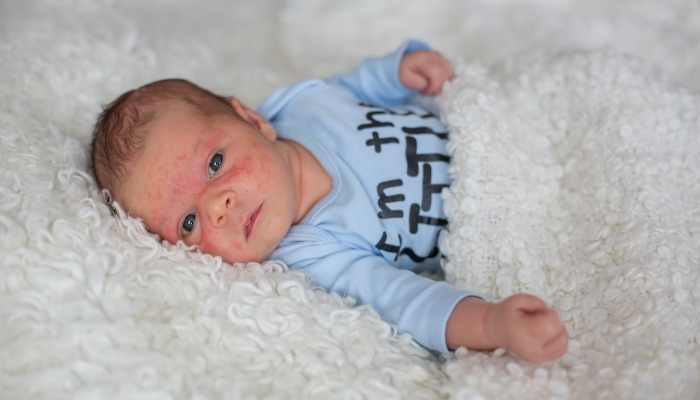
- Baby acne is caused by their mother’s hormones.
- Newborn acne will almost always go away on its own and will not leave permanent scars.
- Keep your baby’s sensitive skin clean with warm water and fragrance-free soap.
- You might need to seek treatment from a dermatologist if your baby has severe acne.
- Avoid scrubbing or picking at your child’s skin, even if they have severe acne.
When you think of acne, the first thing that probably comes to mind is middle school or premenstrual acne. You might be caught off guard if your tiny newborn breaks out one day with little red bumps all over their face.
Teenagers and adults might feel embarrassed about their skin condition and seek acne treatments right away, but should you try to get rid of baby acne?
Baby acne is very common and won’t cause lasting harm to your baby. In fact, your baby won’t be bothered or even notice that their skin is covered in tiny white bumps.
What Is Baby Acne?
Baby acne is very similar to acne in adults and adolescents. It usually appears around 2-4 weeks old and will eventually fade away. There are two types of baby acne: neonatal acne and infantile acne.
Neonatal Acne
Neonatal acne is acne that appears in babies 3 months old and younger. It appears as small white bumps on the baby’s face, neck, and trunk.
Neonatal acne appears in 1 out of every 5 newborns according to Michael Samycia, MD and Joseph M. Lam, MD in an article published in the Canadian Medical Association Journal. Neonatal acne will resolve without leaving any lasting marks or problems.
Infantile Acne
Acne occurring in children older than 3 months is called Infantile acne. Infantile acne can last for up to two years. It is usually more severe than neonatal acne and can cause cysts and nodules. Infantile acne is much less common than neonatal acne, with only 2% of children affected.
Infantile acne is more likely to require treatment and can occasionally lead to scarring. Children who suffer from infantile acne are more likely to have adolescent acne later.
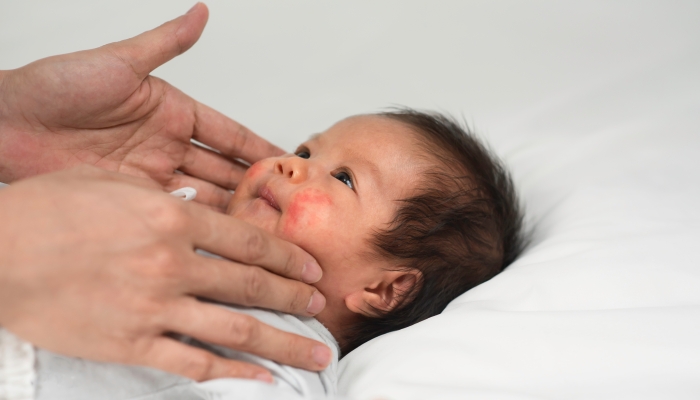
What Causes Acne in Babies?
Similarly to a lot of adult acne, baby acne is caused by hormones. Neonatal acne is generally the result of the mother’s hormones circulating in the baby’s body, and infantile acne is generally caused by an overproduction of the baby’s hormones.
In some cases, severe infantile acne is the first sign of congenital adrenal hyperplasia, a disorder of hormones, and can generally be treated with hormone therapy.
Baby boys are more likely to suffer from baby acne, possibly because testosterone is the hormone most responsible for breakouts. Unfortunately, there is not much you can do to prevent baby acne.
Does Your Baby Have Acne or Is It Something Else?
When your baby gets red or irritated skin, don’t always assume it’s acne. You might be wondering what other conditions can look like baby acne. There are some subtle ways to tell the difference between baby acne and other skin problems.
Baby Acne
Baby acne looks very similar to adult acne. Small red or white bumps cover the face and neck, giving your baby’s face a splotchy appearance. Sometimes the redness can look more pronounced when your baby is fussing or crying.
In younger babies, the bumps are usually small and can be found on the forehead, cheeks, and neck. In older babies, the bumps may be larger and can become severe whiteheads or blackheads.
If it gets severe, these bumps can even become large cysts that require drainage. Never attempt to drain or pop the whiteheads or blackheads.
Heat Rash
Heat rash can sometimes be mistaken for baby acne. Heat rash causes tiny red bumps where the skin overheats and moisture gets trapped. Babies with heat rash may develop water blisters, and their skin is usually itchy and irritated.
Milia
Milia is often confused for baby acne, but they are not quite the same thing. Rather than being caused by hormones, the small white bumps called milia are caused by dead skin cells getting trapped under the surface of new healthy skin.
About 50% of newborns will develop milia, which does not require any treatment.
Herpes
Unlike baby acne, which is harmless, herpes infections can be very dangerous for newborns and infants. Bumps and irritation caused by herpes will appear around the mouth and eyes and are often accompanied by a fever.
If you suspect that your baby has herpes, talk to your baby’s doctor right away.
Allergic Reaction
Some allergic reactions can cause babies to break out in hives or a rash that could be confused for baby acne. If you notice that your baby has a sudden change in their skin, it might be an allergic reaction.
Allergic reactions can become serious very quickly. If you notice your baby has any swelling around their face or seems to struggle to breathe, take them to an emergency department or call 911 immediately.
How to Get Rid of Baby Acne
If your baby develops acne, don’t worry. It will usually go away on its own after a few weeks. However, there are some things you can do to keep your baby’s skin healthy.
Keep Skin Clean
When you wash your baby, always use a fragrance-free, mild soap. Gently wash your little one’s skin and avoid any irritating chemicals. Try only to wash them once or even every other day to avoid making their skin dry, and always finish with a gentle moisturizer.
See a Dermatologist
Baby acne is more concerning as your baby gets older. If your baby is over a few months old, they may need a medicated cream or ointment to clear up their acne. Consider bringing a list of the soaps and detergents you use to see if any of them might be irritating your baby’s skin.
Benzoyl Peroxide
One of the few medications that might be prescribed for baby acne is benzoyl peroxide. While you should discuss treatment with your baby’s pediatrician before starting any creams or medications, benzoyl peroxide is generally regarded as safe.
Avoid Adult Acne Treatments
Never use adult acne wash or creams on your baby’s face. Baby’s sensitive skin can be damaged by the harsh ingredients found in adult products. Only use a mild baby soap.
Let It Be
Picking at or scrubbing your child’s skin can cause additional irritation and pain for your baby. Picking at the skin may even make your baby’s acne worse. Since most baby acne resolves on its own, it might be best to wait it out.
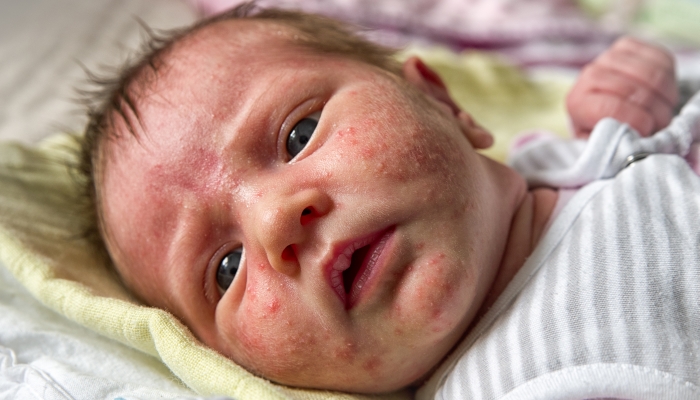
When to Consult a Doctor About Your Baby’s Acne
If you are concerned about your baby’s skin condition, you can see your baby’s pediatrician or a pediatric dermatologist for specific advice.
Pain
If your baby seems uncomfortable or cries when anything touches their face, they may be in pain. Baby acne shouldn’t cause any pain, so if your baby is uncomfortable, there might be something else wrong.
Blistering or Drainage
Blisters on your baby’s face and neck are concerning and should always be assessed by a physician. If the acne on your baby’s face causes large cysts that drain fluid, they probably need treatment by a dermatologist.
Rash Over the Whole Body
A baby’s acne is usually confined to their face and neck. If tiny white bumps seem to appear all over your baby’s body, it might be caused by more serious skin conditions.
Baby Scratching
Small infants often wear little mittens to keep themselves from scratching their face accidentally. Older babies and children may start to purposely scratch at their face. Because babies have very sensitive skin, they may need special creams to prevent itching and irritation.
FAQs
Is baby acne painful or itchy?
Neither neonatal or infant acne should be painful or itchy. Although their skin’s surface may appear tender or irritated, the tiny bumps should not cause your baby any discomfort.
Can a mother’s diet cause baby acne?
While a mothers hormones are often responsible for neonatal acne, a mothers diet does not have much impact on their baby’s skin condition. Some theories exist that state that pregnant and breastfeeding mothers should avoid a high fat or high sugar diet to avoid baby acne, but this theory remains unproven.
Does breast milk help treat baby acne?
Breast milk is often considered a miracle liquid. In fact, it is commonly referred to as “liquid gold.” Providing your baby with breast milk to drink can help them avoid infections and provides them with great nutrition.
It can be used for a bath or to make lotions, but has not been shown to be effective for treatment of baby acne. However, applying breast milk to your baby’s acne will not harm them or make it worse, if it is something you would like to try.
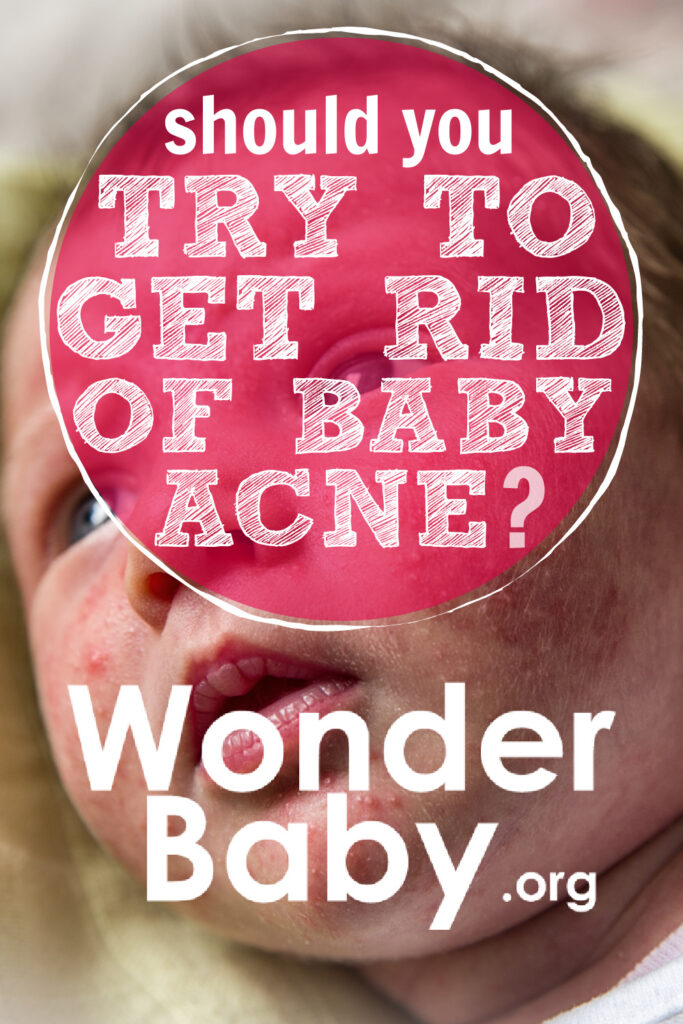
The information WonderBaby provides is not intended to be, and does not constitute, medical or other health advice or diagnosis and should not be used as such. Always consult with a qualified medical professional about your specific circumstances.
Related Posts

Eye Conditions and Syndromes, Visual Impairment
Neuralink Announces Plans to Restore Sight to the Blind with Brain Chip
Elon Musk’s company Neuralink has announced plans to begin human trials of its new “Blindsight” brain chip by the end of 2025.
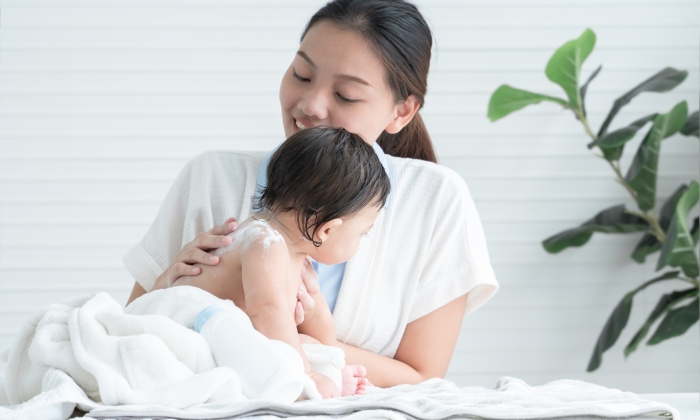
Health & Nutrition
Can Baby Skin Care Products Expire?
Is that forgotten tube of diaper rash cream still safe to use? Learn more about the expiration dates of popular skin care products for infants.

Health & Nutrition
Boosting Immunity in Kids: 3 Tips for a Healthy Winter
Parents can help boost their kids’ immunity during cold and flu season by maintaining healthy eating, sleeping, and exercising habits in the winter.